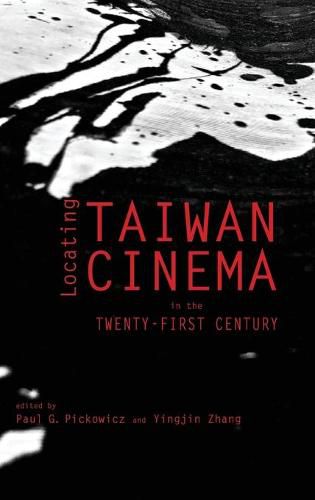Readings Newsletter
Become a Readings Member to make your shopping experience even easier.
Sign in or sign up for free!
You’re not far away from qualifying for FREE standard shipping within Australia
You’ve qualified for FREE standard shipping within Australia
The cart is loading…






This title is printed to order. This book may have been self-published. If so, we cannot guarantee the quality of the content. In the main most books will have gone through the editing process however some may not. We therefore suggest that you be aware of this before ordering this book. If in doubt check either the author or publisher’s details as we are unable to accept any returns unless they are faulty. Please contact us if you have any questions.
This book is in the Cambria Sinophone World Series headed by Victor H. Mair (University of Pennsylvania).
*Includes images.
Twenty-first-century Taiwan has been evolving in fascinating and complicated ways, in terms of culture, economy, politics, and society. This has led to renewed tensions in relations between the government of mainland China and various camps in Taiwan. In Taiwan, these tensions often focus on issues of identity. Who are the Taiwanese? How are the Taiwanese different from regional and global communities? How are the Taiwanese connected to these communities? Business leaders, factory workers, farmers, and migrants have their opinions. Cultural producers, including filmmakers and pop musicians, offer unique perspectives. Political parties, functioning in a democratic environment, fiercely debate these issues. Remarkably diverse ethnic groups contribute to this ongoing dialogue. This complex twenty-first-century debate in Taiwan is a politically healthy one that takes place both on and off screen.
There has been much discussion of New Wave Taiwan cinema of the 1980s and 1990s, including research that studies the pathbreaking contributions of acclaimed directors like Hou Hsiao-hsien. This book updates the scholarship on Taiwan cinema by taking it into the twenty-first century. It is the first book to take a multidisciplinary approach to evaluating recent Taiwan films. The authors are specialists in cultural studies, history, and the social sciences, and they use different film materials and methodologies to analyze the ways in which filmmakers deal with the evolution of Taiwan’s society, economy, and culture in the new century. The emphasis is placed on the diversity of approaches that characterize recent Taiwan cinema. Taiwanese filmmakers use many forms and genres to tackle pressing issues. In sharp contrast to the late-twentieth-century New Wave filmmakers who were widely regarded as producing art films that had little impact on the domestic market, many recent Taiwan films have enjoyed huge commercial success in Taiwan.
This book probes many crucial controversies: What are Taiwan’s meaningful cultural and historical connections to Japan? How do Taiwanese filmmakers and audiences feel about mainland China? How does Taiwan cinema deal with environmental issues, animal rights, human trafficking, sexuality, and the challenges facing ethnic minorities?
Locating Twenty-First-Century Taiwan Cinema is an important book for collections in Asian studies, film studies, and the social sciences.
$9.00 standard shipping within Australia
FREE standard shipping within Australia for orders over $100.00
Express & International shipping calculated at checkout
This title is printed to order. This book may have been self-published. If so, we cannot guarantee the quality of the content. In the main most books will have gone through the editing process however some may not. We therefore suggest that you be aware of this before ordering this book. If in doubt check either the author or publisher’s details as we are unable to accept any returns unless they are faulty. Please contact us if you have any questions.
This book is in the Cambria Sinophone World Series headed by Victor H. Mair (University of Pennsylvania).
*Includes images.
Twenty-first-century Taiwan has been evolving in fascinating and complicated ways, in terms of culture, economy, politics, and society. This has led to renewed tensions in relations between the government of mainland China and various camps in Taiwan. In Taiwan, these tensions often focus on issues of identity. Who are the Taiwanese? How are the Taiwanese different from regional and global communities? How are the Taiwanese connected to these communities? Business leaders, factory workers, farmers, and migrants have their opinions. Cultural producers, including filmmakers and pop musicians, offer unique perspectives. Political parties, functioning in a democratic environment, fiercely debate these issues. Remarkably diverse ethnic groups contribute to this ongoing dialogue. This complex twenty-first-century debate in Taiwan is a politically healthy one that takes place both on and off screen.
There has been much discussion of New Wave Taiwan cinema of the 1980s and 1990s, including research that studies the pathbreaking contributions of acclaimed directors like Hou Hsiao-hsien. This book updates the scholarship on Taiwan cinema by taking it into the twenty-first century. It is the first book to take a multidisciplinary approach to evaluating recent Taiwan films. The authors are specialists in cultural studies, history, and the social sciences, and they use different film materials and methodologies to analyze the ways in which filmmakers deal with the evolution of Taiwan’s society, economy, and culture in the new century. The emphasis is placed on the diversity of approaches that characterize recent Taiwan cinema. Taiwanese filmmakers use many forms and genres to tackle pressing issues. In sharp contrast to the late-twentieth-century New Wave filmmakers who were widely regarded as producing art films that had little impact on the domestic market, many recent Taiwan films have enjoyed huge commercial success in Taiwan.
This book probes many crucial controversies: What are Taiwan’s meaningful cultural and historical connections to Japan? How do Taiwanese filmmakers and audiences feel about mainland China? How does Taiwan cinema deal with environmental issues, animal rights, human trafficking, sexuality, and the challenges facing ethnic minorities?
Locating Twenty-First-Century Taiwan Cinema is an important book for collections in Asian studies, film studies, and the social sciences.